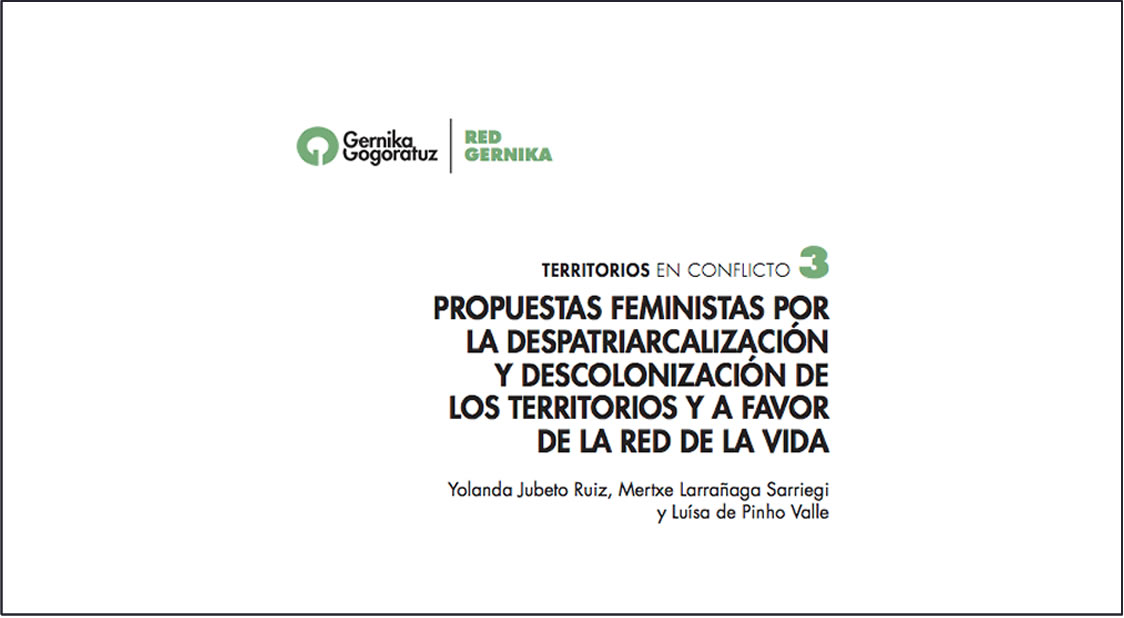
FEMINIST PROPOSALS FOR DEPATRIARCHALISATION AND RECOLONISATION OF LAND IN FAVOUR OF THE WEB OF LIFE
By Yolanda Jubeto Ruiz, Mertxe Larrañaga Sarriegi and Luísa de Pinho Valle
Yolanda Jubeto Ruiz is a lecturer in the Department of Applied Economics I in the Faculty of Economics and Business at the University of the Basque Country (UPV/EHU), and a researcher for the Hegoa Institute and the feminist economics team (Ekosolfem) of the Alternative Humane Economics Network (REAS). She is a member of the International Association for Feminist Economics (IAFFE) and the European Gender Budgeting Network. She is on the editorial board for the Revista de Economía Crítica (Critical Economics Review) and collaborates actively in the organisation of the biannual Critical Economics sessions and in the Spanish state’s Feminist Economics Days. She specialises in feminist economics, humane economics and local human development.
Mertxe Larrañaga Sarriegi has a PhD in Economics from the University of the Basque Country (UPV/EHU) and is a professor in the Department of Applied Economics I. She is also a lecturer in international economics at the Faculty of Economics and Business. She is a researcher for the Hegoa Institute. She specialises in feminist economics and local human development, subjects she teaches on several master’s degrees. She is the author of several publications focused fundamentally on the issue of work. At present, she is in charge of the Master’s in International Development and Cooperation at UPV/EHU. She was the first Director of Equality at the University of the Basque Country.
Luísa de Pinho Valle is a doctoral student on the programme “Democracy in the 21st Century” at the Centre for Social Studies at the University of Coímbra. She has a degree in law from the University of Santa Úrsula (Rio de Janeiro, Brazil), and she is studying a specialisation in public law and public administration at the University Centre of Brasilia (Brazil). She has master’s degrees in Law from the University of Brasilia (Brazil) and Social and Legal Sciences from Pablo de Olavide University (Seville, Spain), and the subjects she analyses in her research stem from the ecofeminist perspective in dialogue with epistemologies of the South.
This material is an extract from the book Territorios en conflicto. Claves para la construcción de alternativas de vida (“Lands in conflict. Keys to constructing life alternatives”), from the Gernika Network collection.
INDEX
BASIC CONCEPTS OF FEMINIST THINKING
ANALYTICAL FRAMEWORK TO UNDERSTAND DOMINATION RELATIONSHIPS
Decolonial feminism versus the patriarchal capitalist colonial legacy
Lessons from community/indigenous feminism
Ecofeminist contributions
The capability approach and the sustainability of life
THE MULTIPLE DIMENSIONS OF VIOLENCE AGAINST WOMEN
STRATEGIES FOR RESISTANCE AND RESOLUTION: SOME REFLECTIONS
BIBLIOGRAPHY
RESOURCES TO STRENGTHEN KNOWLEDGE AND RESOLVE CONFLICTS
Feminist research methodology
Strategies for depatriarchisation and decolonisation
Video for reflection
